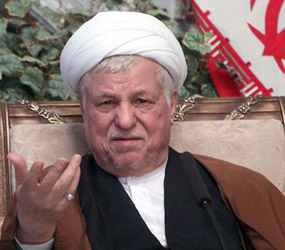Tuesday, August 24, 2010
|
Home
>
Radio Zamaneh in English
>
Latest News
>
Ayatollah Rafsanjani defends his "silence"
|
Ayatollah Rafsanjani defends his "silence"

ILNA - Ayatollah Hashemi Rafsanjani
Akbar Hashemi Rafsanjani, Chairman of Iran’s Expediency Council, announced today that in view of the unfavourable situation of the country and “inspired by the ways of great religious models,” he has chosen to remain silent.
ILNA reports that in a meeting with the members of the Moderation and Development Party, he claimed that in expressing his stance, he has always kept in mind the “interest of Islam, the Revolution and the people.”
He also added that his proposals for getting the Islamic Republic out of its current “crisis” remain the same as the ones he had once mentioned in his July 16 speech at Tehran Friday Mass prayers.
In that speech, Ayatollah Rafsanjani advised the government to release all political prisoners, attend to the families of post-election victims and create an open and free environment for the opposition to peacefully express its point of view.
He claimed that after five months, none of these proposals have been put into action
and he still believes in the validity of his proposed plan of action.
Ayatollah Hashemi Rafsanjani’s reference to his “silence” is in response to the Supreme Leader’s statement last week that criticized the country’s “elite” for their silence and assumption of “two-sided” stances in the post-election events.
Ayatollah Rafsanjani also claimed that in his opinion, Ayatollah Khamenei is the only person who can resolve the country’s current crisis.
He added that unlawful and extremist action committed by any faction has never been “approved” by Ayatollah Khamenei.
He also maintained that “since the victory of the Revolution, whenever the extremists have become more active and present in the scene, we have not witnessed good results.”
|
|

